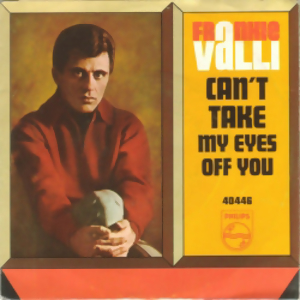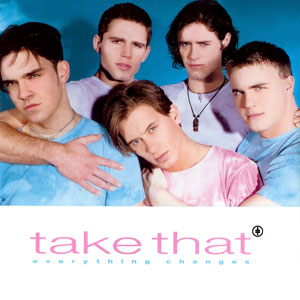
The Righteous Brothers were originally an American musical duo of Bill Medley and Bobby Hatfield. They began performing together in 1962 in the Los Angeles area as part of a five-member group called the Paramours, but adopted the name "The Righteous Brothers" when they embarked on their recording career as a duo. Their most active recording period was in the 1960s and 70s, and although the duo was inactive for some years, Hatfield and Medley reunited in 1981 and continued to perform until Hatfield's death in 2003. Their emotive vocal style is sometimes dubbed "blue-eyed soul".

In their native United Kingdom, between 1962 and 1970, the English rock band the Beatles released 12 studio albums, 13 extended plays (EPs) and 22 singles. However, the band's international discography is complicated, due to different versions of their albums sometimes being released in other countries, particularly during their early years on Capitol Records in North America. The Beatles' discography was originally released on the vinyl format, with full-length long plays (LPs), shorter EPs and singles. Over the years, the collection has also been released on cassette, 8-track, compact disc (CD), on a USB flash drive in MP3 and 24-bit FLAC format, and on digital media streaming services. Although their output has come to include vault items and remixed mash-ups, the Beatles' "core catalogue", recorded between 1962 and 1970, comprises 213 songs, totalling approximately 10 hours of music. Additionally, they released five tracks that are different versions of previously released songs: "Love Me Do", "Revolution", "Get Back", "Across the Universe" and "Let It Be"; two tracks in German: "Komm, Gib Mir Deine Hand" and "Sie Liebt Dich"; and two tracks that are duplicates of songs included on previous albums but also included on the album Yellow Submarine: "Yellow Submarine" and "All You Need Is Love".

Stars on 45 was a Dutch novelty pop act that was briefly very popular throughout Europe, and in the United States, and Australia in 1981. The group later shortened its name to Stars On in the U.S., while in the UK and Ireland it was known as Starsound. The band, which consisted solely of studio session musicians under the direction of Jaap Eggermont, formerly of Golden Earring, popularized medley recordings made by recreating hit songs as faithfully as possible and joining them together with a common tempo and underlying drum track.

Abbey Road is the eleventh studio album by the English rock band the Beatles, released on 26 September 1969 by Apple Records. Named after the location of EMI Studios in London, the cover features the group walking across the street's zebra crossing, an image that became one of the most famous and imitated in popular music. The album's initially mixed reviews were contrasted by its immediate commercial success, topping record charts in the UK and US. Lead single "Something" / "Come Together" was released in October and topped US charts.

"Come Together" is a song by the English rock band the Beatles, written primarily by John Lennon and credited to Lennon–McCartney. The song is the opening track on their 1969 album Abbey Road and was also released as a single coupled with "Something". The song reached the top of the charts in the United States and peaked at No. 4 in the United Kingdom.

The Lettermen are an American male pop vocal trio. The Lettermen's trademark is close-harmony pop songs with light arrangements. The group started in 1959. They have had two Top 10 singles, 16 Top 10 singles on the Adult Contemporary chart, 32 consecutive Billboard chart albums, 11 gold records, and five Grammy nominations.

"Do You Want to Know a Secret" is a song by English rock group the Beatles from their 1963 album Please Please Me, sung by George Harrison. In the United States, it was the first top ten song to feature Harrison as a lead singer, reaching No. 2 on the Billboard chart in 1964 as a single released by Vee-Jay, VJ 587.

"The Beatles' Movie Medley" is a compilation of snippets from various Beatles songs. It remains the only Beatles single not released on compact disc or music download. The single peaked at #12 on the Billboard Hot 100, and #10 on the British charts in 1982. The songs were chosen from the Beatles' films, A Hard Day's Night, Help!, Magical Mystery Tour, Yellow Submarine and Let It Be.

"You've Lost That Lovin' Feelin'" is a song written by Phil Spector, Barry Mann, and Cynthia Weil. It was first recorded by the Righteous Brothers in 1964, produced by Phil Spector. Their recording is considered by some music critics to be the ultimate expression and illustration of Spector's "Wall of Sound" recording technique. It has also been described by various music writers as "one of the best records ever made" and "the ultimate pop record".

"Stars on 45" is a song issued in January 1981 by Dutch studio group Stars on 45. In some countries, including the UK, Ireland and New Zealand, the band was credited as 'Starsound' and the medley itself was named "Stars on 45".

Long Play Album was the first album by the Dutch soundalike studio group Stars on 45, released on the CNR Records label in The Netherlands in 1981. In the US the album was retitled Stars On Long Play, released on Atlantic Records' sublabel Radio Records and credited to 'Stars On'. In the UK, Ireland, Australia and New Zealand the group was renamed 'Starsound' and the album itself was listed as Stars On 45 or Stars On 45 - The Album and released by CBS Records. In Spanish-speaking countries both the group and the album were launched under a fourth name: Estrellas en 45. Stars On 45 was also one of the very few Western pop albums to be officially released in the Soviet Union and large parts of the Eastern Bloc on the state-owned Melodiya label, credited to Stars On 45 but the Russian title of the album translates as Discothèque Stars and in Czechoslovakia on the state-owned Opus label as "Stars on 45". In the Philippines, it was released and uses "Stars on 45 Long Play Album" as its title on the label of the LP.
"Theme from A Summer Place" is a song with lyrics by Mack Discant and music by Max Steiner, written for the 1959 film A Summer Place, which starred Sandra Dee and Troy Donahue. It was recorded for the film as an instrumental by Hugo Winterhalter. Originally known as the "Molly and Johnny Theme", the piece is not the main title theme of the film, but a secondary love theme for the characters played by Dee and Donahue.

"(I've Had) The Time of My Life" is a 1987 song composed by Franke Previte, John DeNicola, and Donald Markowitz. It was recorded by Bill Medley and Jennifer Warnes, and used as the theme song for the 1987 film Dirty Dancing. The song has won a number of awards, including an Academy Award for Best Original Song, a Golden Globe Award for Best Original Song, and a Grammy Award for Best Pop Performance by a Duo or Group with Vocals.

"Can't Take My Eyes Off You" is a 1967 song written by Bob Crewe and Bob Gaudio. It was recorded as a single by Frankie Valli. The song was among his biggest hits, earning a gold record and reaching No. 2 on the Billboard Hot 100 for a week, stuck behind "Windy" by the Association. Gaudio was a bandmate of Valli's in the Four Seasons. It was Valli's biggest solo hit until he hit No. 1 in 1975 with "My Eyes Adored You".
"To Know Him Is to Love Him" is a song written by Phil Spector, inspired by words on his father's tombstone, "To Know Him Was To Love Him." It was first recorded by the only vocal group of which he was a member, the Teddy Bears. Their recording spent three weeks at No. 1 on the Billboard Hot 100 chart in 1958, while reaching No. 2 on the UK Singles Chart chart. Peter & Gordon and Bobby Vinton later had hits with the song, with its title and lyrics changed to "To Know You Is to Love You". In 1987, the song was resurrected by Dolly Parton, Linda Ronstadt, and Emmylou Harris, whose Trio recording topped the U.S. country singles chart. The song is in 12/8 time.

"This Guy's in Love with You" is a song written by Burt Bacharach and Hal David, and recorded by Herb Alpert. Although known primarily for his trumpet playing as the leader of the Tijuana Brass, Alpert sang lead vocals on this solo recording, arranged by Bacharach. An earlier recording of the song was by British singer Danny Williams titled "That Guy's in Love", which appears on his 1968 self-titled album.

"Everything Changes" is a song by British boy band Take That. The song was the fifth single from the band's second studio album, Everything Changes. It was written by Gary Barlow, Michael Ward, Eliot Kennedy and Cary Bayliss, and it was produced by Ward. The song features Robbie Williams on lead vocals.
The History of Rock & Roll is a US radio documentary on rock and roll music, originally syndicated in 1969. One of the lengthiest documentaries of any medium, The History of Rock & Roll is a definitive history of the Rock and Roll genre, stretching from the early 1950s to its day. The "rockumentary," as producers Bill Drake and Gene Chenault called it, features hundreds of interviews and comments from numerous rock artists and people involved with rock and roll.

Note: For the song, see "What Love Has Joined Together"

"Hurt So Bad" is a song written by Teddy Randazzo, Bobby Weinstein, and Bobby Hart. It is a classic 1965 Top 10 hit ballad originally recorded by Little Anthony & The Imperials. Linda Ronstadt also had a Top 10 hit with her cover version in 1980. The song has been re-recorded by numerous artists including The Lettermen, who took the song to number twelve in September 1969.















